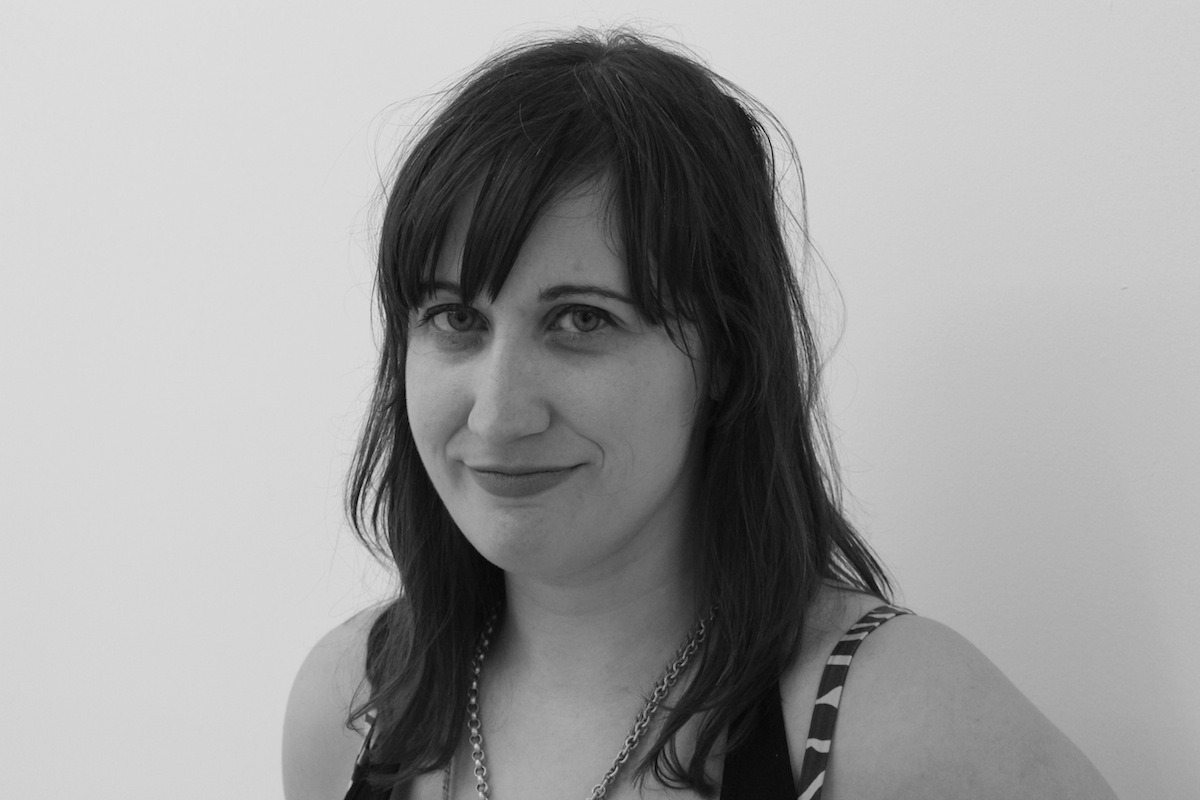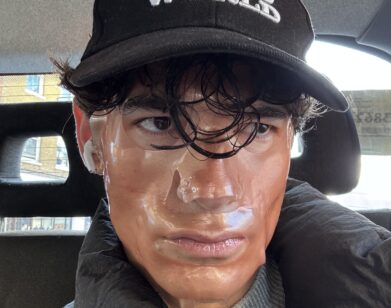Amy Lawless Brings Up Her Dead

On the refrigerator of poet Amy Lawless’ East Village apartment are a picture of her nephew, a photo-booth strip of friends, a small chart of this year’s moon cycle, and a postcard that reads, “Don’t Worry About Death.” With a bold, femme-luxe style that might recall Miranda July, Lena Dunham, or Amy Sedaris, these subtly mystic, sentimental bits and pieces befit the writer. Her new book of poetry, My Dead, marks a departure from the more humorous work that can be found in her debut, 2008’s Noctis Licentia. Lawless was the 2011 recipient of New York Foundation of the Arts’ prestigious award for poetry, and was recently picked up by Octopus Books, which releases her new book today.
My Dead delves into the process of mourning loved ones with Lawless’ calm, characteristically non-melodramatic poise. She cites videos of elephant mourning rituals seen on the Internet as a main source of inspiration. While humor might have been used to subvert heavier topics in the past, she chooses control and intimate dissection this time around. Lawless will be heading out on the “Sex and Death” tour with fellow Octopus writer James Gendron, with a reading at Goodbye Blue Monday in Brooklyn today. In preparation for her book’s release, she sat down with us to discuss her creative development and how it all started with a hatred of peas.
RYANN DONNELLY: Where did you grow up?
AMY LAWLESS: I grew up in Boston—this area called Roslindale. Do you know Boston at all?
DONNELLY: I only know what would be in approximation to the music venue, The Middle East.
LAWLESS: Oh, I have a reading there Thursday! So, I went to this high school called Boston Latin, which is for nerds. You have to take some test to get in there. It’s the oldest public high school in the country. And, then I went to Boston University. I didn’t leave until I started grad school in New York at The New School.
DONNELLY: When did you start writing poetry?
LAWLESS: I wrote my first poem when I was eight years old. There was this children’s magazine called Cricket Magazine, and my mom got me to enter this contest where you could write about your favorite, or least favorite food. I was sort of contrarian; I didn’t want to write about anything I liked. But I really hated peas. So, I wrote this one-line poem: Peas cannot be eaten with ease. And, my mom said, “Keep writing it!” And, I was like… “No.”
She asked, “What about a title?” “No,” I said, “That’s the poem.” So, we sent it into the magazine, and I won Honorable Mention. They give you this little certificate, and it was framed and put in my room. It became kind of significant, actually, because there was this thing in my room throughout my childhood and teen years saying, “You are a poet.” And, my parents respected that, and would no longer make me eat peas, which meant that I could impact my life by writing a poem. This was empowering on some level. My sister still had to eat peas. So, it was always in my head that I was a poet.
DONNELLY: Were there poets on your radar at that time that you wanted to be like?
LAWLESS: I never really thought about what somebody’s life would be like if they were a poet. I just thought of them as “super famous people.” Like [Henry Wadsworth] Longfellow. We had this anthology of children’s poetry, and all these illustrated books that were very poetic. Most of the poems I heard when I was a kid were rhymed poems. Longfellow and [Edgar Allan] Poe. Robert Frost, too.
DONNELLY: What is your writing process like?
LAWLESS: I talk about this with my friends that also write poetry, and we notice that if we don’t write for awhile, we get kind of grumpy. I don’t have a particular process, but its usually I’ll just be in my room, sometimes just sitting at my desk, and I’ll have Microsoft Word open, and there’s something on my mind—ideas or images or a character. But, the most fun I’ve had lately writing poems is while watching Planet Earth episodes. I like to multi-task. I like to watch a movie and be on my phone and writing. I do well in that chaos. Like, if my life has five windows open at once, I can soften the other four, but they’re still there.
DONNELLY: Do you regiment yourself about when you’re going to write?
LAWLESS: If I haven’t written something in a week, I make sure I have time for it. Lately I’ve been writing prose as well, and that usually has to be first thing in the morning. I don’t feel like I have to do it every day, though.
DONNELLY: What was the editing process like for you? Some of this was done during a trip to Colorado, correct? What was it like to work outside the New York environment?
LAWLESS: The two editors that took the lead in editing my book were Mathias Svalina and Alisa Heinzman. Mathias lives in Denver, and I happened to be going to visit two poet friends, Maggie Wells and Dan Hoy, for New Year’s Eve, so it made sense for Mathias and I to meet up and go over the edits when I was out there, as opposed to doing a three-to-five-hour-long Skype conversation. It was a really empowering process because I had never had such an attentive editorial experience. Mathias is a brilliant poetry editor, and it felt like those little crazy things you think in your head about your words are validated by this person who is not crazy. It became clear that these are things we all think about. Being able to have that conversation was so exciting. And I guess one of my blind spots is putting together a poetry manuscript. When I first gave it to them, the sections were all different. I had made choices, but in working with them, it became whole.
DONNELLY: Were there thematic adjustments that came out of editing the structure?
LAWLESS: Yeah. I write so many different kinds of poems—funny or scatological or whatever. There were certain poems that just didn’t fit My Dead. My Dead is a book that is mostly concerned with death, and things swimming around that topic. There were certain poems that were really funny that just didn’t speak to that. That was the other thing that Mathias was good at pointing out in a very kind way. That goes over so much better when you’re in the room with someone than when you see a Microsoft Word comment next to something that’s like, “Meh.”
DONNELLY: Can you expand on what we can expect from My Dead?
LAWLESS: It was written in four sections. Two of the sections are long poem sequences. “Elephants in Mourning” I wrote after a few of my relatives had died—three in a year and a half. I sort of hadn’t dealt with it for a variety of reasons. One day I was just home watching YouTube videos of elephant mourning rituals, and it moved me so completely, because they remind you of humans keening and mourning. Suddenly, I felt so overwhelmed with my own personal loss. I just wrote the whole “Elephants in Mourning”—a 17- page poem—in a day. It took me a year to edit it, but that was the first piece.
There’s this other piece called “The Skull Behind My Face,” which is about last summer when I was super poor, and I had to move, and I felt like I had no control. I was like, “What am I doing? I’m a poet living in New York, and I can’t afford my rent.” And, I became incredibly afraid of dying. There’s so much I want to do. I want to fall in love, and who knows, maybe have a baby someday. I want to go to one job every day, go to the beach, and see all these parts of the world. If I die right now, or if I die tomorrow… that’s going to be a big problem.” It became all I could think about. I couldn’t sleep.
DONNELLY: Was it a depressing feeling, or were you motivated by it?
LAWLESS: It was both; it was like this soft-core mix. I didn’t know what to do about it. Just crossing the street became this thing. I didn’t really adjust my behavior, but I was sort of depressed and anxious. So I just started writing. I wrote this long poem that was originally called “Hydrangea.” It was summertime, and I think I really wanted male human contact, also. And I sort of distracted myself from my fear of death. Then one day my phone rang, and it was Zachary Schomburg from Octopus Books, he was like, “Hey, Amy. Is My Dead being published?” And, I was like [assumes a drab, pathetic voice], “No.” Meanwhile, I was staring at dead flowers while I’m on the phone with him. And he asked if he could publish the book, and I was like, “Yeah! Of course!” And, suddenly the fear of death was quieted by the idea of having a book come out. I mean, no one wants to die, it’s just one of those things that gets louder and quieter depending on what life is like.
DONNELLY: It’s sort of surprising to hear you describe this fear as “anxious,” because some of the poems seem—certainly heavy, but like they are dealing with these topics in a very calm way.
LAWLESS: I felt very much on top of those feelings. I felt like everything was very technical or bright. Sometimes poets can be vague, writing through these things. But, the feeling I had was so crystalline, and I had been playing with the feelings and images in my head for a week or two. Lately, I find writing prose makes me feel more in control, which is why that piece, “The Skull Behind My Face,” and most of “Elephants in Mourning,” are prose poems. I think that was another formal constraint that I put on it to create that control.
DONNELLY: How do you compare My Dead to your last collection, Noctis Licentia?
LAWLESS: Noctis Licentia is very different because some of it was written in grad school, and some of it was written in the year following my graduation from The New School MFA program. During that time I was very influenced by peers, and my former mentor, Paul Violi. He has passed away, but he was very much known as a “funny” poet. I was influenced by a lot of New York School poets at the time, and I think that I just thought that I was supposed to be a funny poet.
DONNELLY: Do you still hate peas?
LAWLESS: I still really do not like peas.
MY DEAD IS OUT TODAY. AMY LAWLESS WILL READ AT GOODBYE BLUE MONDAY IN BROOKLYN TONIGHT.






